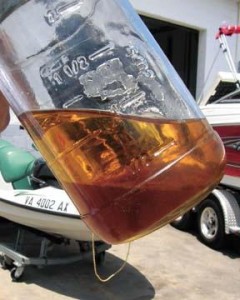Fuel Tanks Beware: The Ethanol Issue
 As many boaters know, the Environmental Protection Agency has been cracking down of production of inefficient vehicles in recent years – whether they are designed to drive along roads or motor through a waterway. In some respects, the influx of restrictions and guidelines has been a good thing. After all, most boaters want to make as little lasting environmental impact as possible as they go about their hobby.
As many boaters know, the Environmental Protection Agency has been cracking down of production of inefficient vehicles in recent years – whether they are designed to drive along roads or motor through a waterway. In some respects, the influx of restrictions and guidelines has been a good thing. After all, most boaters want to make as little lasting environmental impact as possible as they go about their hobby.
Unfortunately, all this eco-awareness has led the EPA and many government lobbyists to embrace the ethanol industry. Ethanol is drawn from corn and acts as an excellent solvent when added to regular fuel. It absorbs water, which can be a serious problem in automotive and marine fuel tanks alike. When much more than 10 percent ethanol is present in fuel, a layering effect occurs.
Most outboard motors are not capable of handling the lumpy layer of sediment that seeps to the bottom of a fuel tank when ethanol and water combine. For those with older, fiberglass fuel tanks, it’s best to avoid ethanol whenever possible and to use good water-separating fuel filters the rest of the time. Make sure to replenish your supply with fresh Evinrude outboard oil, and do your research before switching fuel types.


Comments